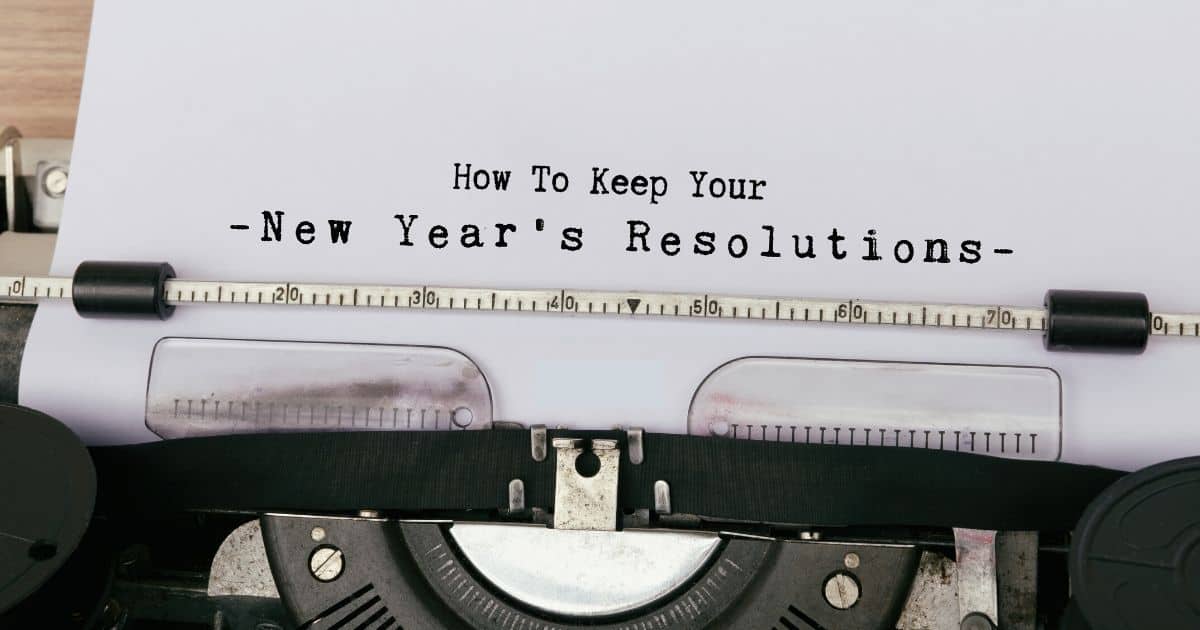
There is a subset of the population for whom the act of setting (and keeping) New Year resolutions is a beautiful fantasy. We’re talking unicorns and flying chocolate Pegasus material here. Anyone else in this exclusive club?
Keeping new year goals can be so difficult.
There are more than a few reasons for that.
Unrealistic expectations:
Sometimes in the spirit of goal setting, we become enamored with the idea of change; it suddenly seems like the sky is the limit; we can do anything! Not only will we start exercising more, we’re going to RUN EVERY DAY. We’re not only going to RUN EVERY DAY, we’re going to RUN 5 MILES AND POWERLIFT EVERY MORNING, and all BEFORE 7 AM!
Reel it in there, Betty. Trying to take on a starter goal that is too large, puts extreme time demands on your schedule or requires too much, too soon is a set up.
Related: How to Find Your Workout Motivation (for couch potatoes)
The goal isn’t actually yours:
Maybe you have a bad case of the Should’s. Goals that are set for the wrong reasons are sure to fail. Are you trying to make a life change because someone has told you it’s important for you to do so? Keeping new year goals is enough of a challenge.
When we are forcing ourselves to adopt someone else’s goals for us, it is even more difficult. Working toward another person’s goals can establish resentments and even worsen our self-esteem.
You lost motivation:
Novelty is a powerful motivator. When it wears off, though, we are often left without motivation to continue pursuing the goal. Losing motivation is often a key factor in not keeping your new year’s resolutions.
Related: The Key to Getting Motivated When You Have ADHD
Setting Goals that Stick
As you create new year goals, determine if your goal is worth attaining by using a litmus test of sorts (sounds scientific, huh? Get out the Bunsen burners and periodic tables, peeps). Ask yourself the following questions to be sure your goal is worthy of your time and attention:
How much do I care about this achievement?
Asking yourself this question will help you figure out if you are doing this for yourself or someone else. If you only care about a goal because someone wants you to change yourself, it’s unlikely to stick.
Does this goal resonate with my sense of self and honor my values?
Part of developing successful new year goals lies in the knowledge of self that can only come from your core value system. At the center of this goal, is there a spark that aligns with your vision of yourself? Does this goal speak to something deeper within you that you need to nurture and develop?
Is this goal set up in “doable chunks”?
(Gawd, doesn’t that sound like a bad porn title or a sinful flavor of ice cream?? Ok, let’s move away from that imagery…) As you create new year goals that you can actually keep, be sure to layer them in a way that allows for smaller successes that build into your ultimate goal.
For example, if your big goal is to gain 10 pounds, approach it in increments. (I’m so sick of weight loss goals, aren’t you?) An incremental approach to gaining ten pounds could be increasing calorie intake by 200 per day, or to plan a snack between each meal to boost food intake. This is a more measured approach that is sustainable over time.
Have I created a pros and cons list for this goal?
Sometimes even the coolest goals can have a downside; make sure you explore that before committing to it. Developing a list of pros and cons for a goal will also help you determine your commitment level and whether this goal is true to yourself or for someone else’s benefit.
Keeping Your New Year’s Resolutions

Here we go. Let’s look at that fickle bitch that is MOTIVATION.
Our natural, human tendency is “status quo.” It’s not because we’re lazy, inefficient or incompetent (watch that self-talk, woman); the reality is, we are BUSY.
Between work, household demands, family and friendship responsibilities, attention to our own needs and expectations can quickly falter.
When it comes to keeping your new year’s goals, reinforcement and recommitment are crucial.
Create a new norm:
Most of us rely heavily on a sense of routine in daily life. We tend to get up around the same time and mostly participate in the same set of activities of daily life.
When we commit to a new year goal, we need to infiltrate our daily norms and infuse the goal. Maintaining it as part of the new norm is key to getting into automaticity with it.
Struggle with getting yourself organized enough to create a norm? Checkout: How to Master that To Do List When You Have ADHD.
Harness your internal parent.
Use your best “mom voice” on yourself. Channel your inner Molly Weasley voice and practice it out loud. Your mom voice can remind you that just need to do it, whether you like it or not. It’s part of your day now, just like taking a shower and putting on clean clothes. Your goal is for your own good, now do it! (Insert that insistent, yet loving red headed scowl here).
Reward yourself often.
Each and every one of us respond to praise, reward and recognition. Celebrating your ongoing to commitment to a goal and the smaller accomplishments you achieve along the way will help keep you motivated.
Did you succeed in staying on track with your budget all week? Celebrate by making time for a hobby you enjoy or visiting with a friend. Make your accomplishments worth something to your short-term self who cares more about the here and now than your big-picture self does.
And for Pete’s sake, no shaming yourself if you mess up. Kick that perfectionism mess to the curb! Need some help with how? There’s an article for that!
As you continue to work toward keeping your new year goals, pay attention to your internal cues. Sometimes our needs shifts and a goal we set five or six months ago change along with it. Maintain your goals as a fluid process. Revisit your intention and motivations regularly to be sure that your goals are connected to values you embody.
Happy New Year, my friend!
Leave a Reply